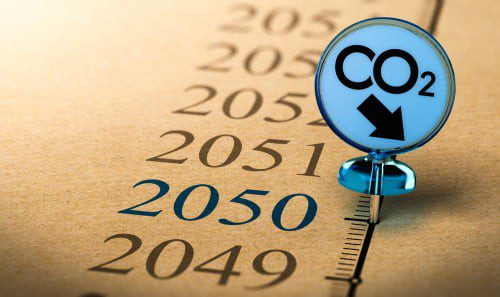A new study conducted by the Mærsk Mc-Kinney Møller Center for Zero Carbon Shipping, examines the top shipping companies’ commitment to decarbonization, and shows that only 35% have clearly expressed emissions target to be net zero by 2050.
The assessment draws on published decarbonization ambitions and actions of the largest companies by owned capacity in tanker, bulk, container, and /car segments. Together, these four segments cause a substantial share (70%) of global maritime emissions.
The state of decarbonization in the maritime industry shows that while real progress has been made, there is a long way to go for the industry to reach net zero within the limited time left to transition.
A comparison with other industries suggests that 35% of shipping companies with IMO or net zero 2050 pledges is low. A 2020 KPMG report looking at top-100 companies by revenue in 52 countries across industries, found that 66% of automotive, 56% of oil and gas, and 45% of transport and leisure companies had sustainability reports with carbon reduction targets.
The MMMCZCS strongly encourages shipowners to set ambitious emissions reduction targets, preferably aligned with a net zero ambition for 2050 or sooner and supplement the pledges with tangible targets and plans already for this decade
said Bo Cerup-Simonsen, CEO of the Mærsk Mc-Kinney Møller Center for Zero Carbon Shipping.
Mr. Cerup-Simonsen also added that “transparency is key for the transition, and there is no doubt that ship owners and operators will increasingly need to be transparent about climate target and actions – not only towards regulators but also to live up to expectations from customers, investors, insurance, the greater public – and not least employees.”
The analysis also shows that the container industry has the highest level of ambition with 16 of the 30 largest firms in the segment having set emissions targets to a 2050 timeline. This translates to 69% of the total container maritime fleet capacity in owned deadweight tonnage.
While action is needed from shipowners, regulators also need to step up and implement mandatory reporting requirements of climate-related impacts subject to third party auditing. Requirements should rely on global standards to increase comparability and avoid creating additional reporting burdens, the MMMCZS recommends
the Center for Zero Carbon Shipping explains.
Government Mandated Sustainability Reporting
Government mandated reporting requirements have not fully solved the problem of needed transparency in the maritime industry. Auditing mechanisms are largely underdeveloped and could benefit from globalized assurance standards for third-party auditing to guarantee the relevance, consistency, and credibility of reports29. Further, mandated reporting is typically only required for publicly traded companies. This excludes a large share of the maritime fleet which is private or state-owned.
Voluntary Reporting Standards and Frameworks
Where reporting is not required, the maritime industry is increasingly undertaking voluntary sustainability reporting in response to growing pressure from stakeholders. In the absence of globally regulated standards for emissions reporting, companies have turned to private standards31. The most widely accepted being the Greenhouse Gas Protocol (GHGP), built on the Kyoto Protocol’s definition of GHGs, it specifies calculation methods for Scope 1, 2, and 3 emissions32. While widely used private standards, like the GHGP, provide a degree of comparability, self-imposed reporting without a third-party regulator can be unsystematic and can lead to gaps in reported emissions.
In addition to reporting standards that provide methods for calculating emissions, privately developed frameworks guide companies on how to structure and present information. In response to growing pressure from investors, two commonly frameworks have been developed to standardize reported information on environmental risks including impacts and opportunities due to climate change.






